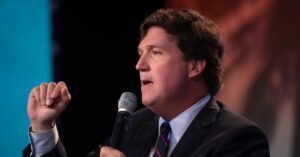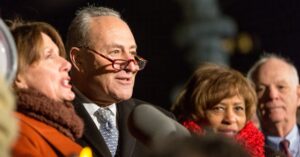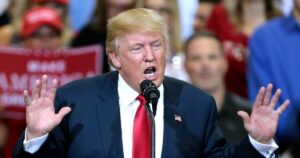New White House and media clash over Michigan rally misunderstanding
In a recent rally in Warren, Michigan, President Donald Trump refuted a media claim that he had mistakenly identified Michigan Republican Rep. John James as the sponsor of a new impeachment effort. Instead, the White House clarified that Trump directly addressed Rep. Shri Thanedar, who was responsible for the initiative.
During President Trump's rally in Warren, a dispute emerged between the White House and NewsNation over an alleged misidentification involving Rep. John James and an impeachment effort led by Rep. Shri Thanedar.
Last week marked the first 100 days of President Donald Trump’s second term in office. To commemorate this milestone, the President held a high-energy rally in Warren, Michigan. During the event, he shared various achievements of his administration, including policies on deportations and tariffs, while also criticizing former President Joe Biden.
White House Defends President's Statements
At the rally, attention was drawn to a new effort to impeach him, introduced by Rep. Shri Thanedar, a Democrat. Trump addressed Michigan Republican Rep. John James in the crowd, asking if he was aware of the person spearheading the impeachment effort. This interaction sparked a controversial report by NewsNation.
The report released by NewsNation suggested Trump had erroneously accused Rep. John James of sponsoring the resolution against him. This narrative quickly drew attention, prompting the White House to respond. They contended that Trump’s remarks were misinterpreted by the media outlet.
A statement from the White House disputed NewsNation's account, explaining that the President had inquired from Rep. John James about the activity of Democratic Rep. Shri Thanedar, not attributing the impeachment resolution to him. According to the White House, Trump’s question to James was in reference to Thanedar’s actions.
Updates and Reaction from Media
NewsNation faced pressure from the White House to clarify the situation by updating its coverage. The statement from the White House forcefully criticized not just NewsNation, but also a larger trend in media that disregarded accuracy for sensational reporting.
The report by NewsNation was featured prominently, including a mention in the Politico Playbook newsletter. Despite the White House's pushback, neither NewsNation nor Politico has commented on the matter publicly. The apparent silence on their part has left some questioning the veracity and responsibility of these media outlets.
Trump, never one to shy away from addressing the media directly, took the opportunity at the rally to express his frustration over recurring impeachment efforts. On stage, he mentioned his bewilderment at the repeated attempts, characterizing them with disdain.
Public Trust and Media Coverage
The ensuing battle between the White House and NewsNation raises broader questions about journalistic integrity and the relationship between the media and the administration. As misinformation and accusations continue to circulate, trust levels in the press are noted to be historically low.
Criticism of the media has become a familiar theme in the current political landscape. The White House underscored this point by highlighting the public's diminishing trust in news outlets. They accused the media of spreading "hoaxes" and failing to accurately cover President Trump’s activities.
A statement conveyed by the administration to Fox News Digital reinforced their position. The White House argued their responsibility was to call out inaccuracies and "fake news," striving for truthful reporting about Trump's presidency.
Looking Forward Amidst Ongoing Debate
As events unfold, this particular episode may serve as an illustration of tensions between political figures and media institutions. While the White House has maintained its stance, the rebuttal has not extinguished the ongoing conversation around media responsibility.
While both sides remain in their respective corners, the larger implications of such disputes are significant. The event in Warren has become a microcosm for broader discussions about how political news is reported and interpreted.
Attention will be on how the media and political figures navigate future interactions, with potential impacts on the public’s understanding of current affairs. How the story of President Trump’s rally in Warren and the associated media coverage evolves may influence these dynamics.
Ultimately, the narrative surrounding the White House's reaction to NewsNation's reporting has intensified discussions on media objectivity. Both parties seem poised to uphold their versions, highlighting an ongoing interplay in the public arena.
Readers and followers remain engaged, parsing through the layers of statements and counter-statements that characterize the current political media environment. The trajectory of this dialogue will likely continue shaping perspectives across the nation.




